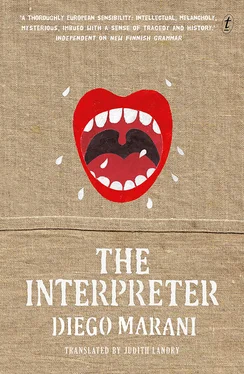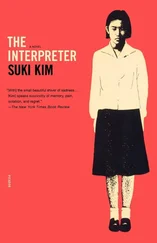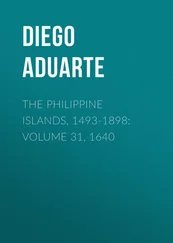‘The glottologist comes once a month, and then I have to do my exercises like a good boy. But Frau Goldstein doesn’t know Seroa, so on every other Tuesday I can talk gibberish to my heart’s content! I send her smacking kisses and other rude noises down the microphone, and she squints at me and frowns suspiciously. She knows I’m teasing her, but she feels there’s always a remote possibility that my smackers might indeed be Seroan, as rendered in a refined mediaeval Lesotho accent!’
For all his cast-iron cheerfulness, though, I could tell that Kwiatkowski was suffering. At table on occasions he would seem to withdraw completely, as though he’d lost consciousness and all that remained of him was an automaton, staring into thin air with frightened eyes, hands trembling. On such occasions, we were supposed to call the nurse, but none of us felt like putting the colonel into Frau Goldstein’s clutches; he’d be put into isolation, and we were all secretly convinced that that was the last thing he needed, so we’d carry on talking calmly among ourselves. Mrs Popescu took it upon herself to make sure that he didn’t tip over plates or drop cutlery during his absences, which might last several minutes. When at last he had shaken off the vice-like grip of whatever it was that was making mincemeat of his brain, Kwiatkowski would carry on sounding off in his ringing tones as though nothing had happened; but he knew that he had had an attack, and that we had protected him. Mrs Popescu would whisper something into his ear in Polish, and he’d give us a mild, grateful look. A sort of solidarity had been established around our table; we would protect and help each other, or perhaps simply respect each other. No one tried to encourage the silent Vidmajer to speak; Kwiatkowski himself never tried to rile him, preferring to concentrate his fire on the stolid Ortega, who would take it all with a smile. Together we would handle Vandekerkhove’s blackouts, waiting for them to pass of their own accord, and then we would answer his tortuous questions patiently. We all held Mrs Popescu in high regard; she was very reserved and shy; strangely enough, she was the one person of whose illness Ortega had told me nothing, and I never had the courage to ask. Rather than suffering from any psychic ill, she seemed oppressed by some shadowy fear, remote by now, but which would sometimes loom up again and put her in a state of high alert; then she would become red in the face, and hot, as though from fever, her breathing would become laboured and she would look around her as though seeking someone. She hardly ever stayed on in the common room after supper; she would never join the group of patients who went to read in the library, though she would sometimes stop to talk to Mrs Vukobrat, to drink a herbal tea or have a game of dominoes; and she never missed the Thursday-night piano recital, when she’d always sit in the front row, eager and attentive. The moment the music stopped, before the small audience had begun to rise to their feet, she would leave the room almost at a run. I’d noted the yellow strip on her jacket pocket indicating Romanian, and wondered what her problem could possibly be; like me, she was forbidden to speak her mother tongue. One afternoon I was resting in my room after my intensive German course, prior to attending a hypnosis session, when I heard a knock at the door; I thought it must be the nurse who would be taking me down to it, but it was too early. What I saw in the darkened corridor was in fact the delicate silhouette of Mrs Popescu, gesturing to me fearfully to let her in.
‘Forgive my intrusion!’ she exclaimed in agitated German; I drew up a chair and told her to sit down.
‘I know I shouldn’t be doing this, and it certainly won’t do me any good, but I’m at the end of my tether!’
She was twisting her hands as she looked at me, her knuckles positively white; I noticed that her fingers were unpleasantly yellow, her nails ridged with bony excrescencies. Her breathing was laboured, broken by suppressed sighs, as though she were about to cry.
‘Please, I beg of you, speak to me a little in Romanian!’ she implored me, now really on the point of tears.
I sat down on the edge of the bed; I wasn’t sure that I had heard her aright.
‘What do you want me to say?’ I asked awkwardly.
‘Whatever you like, but please, just let me hear some Romanian!’ she insisted tearfully. Seated in the middle of the room, her hands clasped between her knees, her over-large tunic hanging loosely from her thin shoulders, she looked like someone awaiting sentence for some unknown crime.
I didn’t know what to say; all that came to my mind were inconsequential phrases, woefully ill-judged trivialities. Machine-like, I began to recite a text on the human body which I had memorised a few days ago in the laboratory: ‘The human body consists of the head, torso and limbs. The limbs, that is, the arms and legs, are known as the extremities. The head is home to the brain, the tympanum and many other delicate organs; on it we find the ears, the eyes, the nose and the buccal cavity, in which we find the tongue. We hear with our ears, see with our eyes, smell with our nose and taste with our tongue; so the seat of hearing is in our ears, the seat of sight is in our eyes, the seat of our sense of smell is in our noses and that of taste is in our tongue. Within our torso we find important organs such as the heart, lungs, liver, kidneys, stomach, and the large and small intestines. Our body also contains bones, muscles, veins and nerves. Through our veins runs the blood which bathes our body, starting from the heart and ultimately returning to it. We use our hands for the most varied activities; we use our legs to walk. The body may be either well or diseased; all parts of it may fall ill, be affected by one or more maladies.’
I stopped in mid-flow, struck by the absurdity of my performance. I had spoken as though I was reciting a prayer; in front of me, weeping silently, her shoulders shaking, Mrs Popescu had covered her face with her hands. I didn’t know what to do; I went to the tap and filled a glass of water, but she shook her head when I offered it to her and dried her eyes carefully with her handkerchief. Then she rose hurriedly, rearranged her hair and dabbed at her face with her fingertips.
‘Thank you! You cannot imagine what good that has done me! I promise you it won’t happen again.’ She opened the door, peered cautiously into the corridor and hurried away.
That was how I made the acquaintance of Roxana Popescu, the woman who was to precipitate my renewed search for the interpreter, although I did not know as much at the time. When she came to sit down at table, I saw her in a new light. Looking embarrassed, she flashed me a quick, complicit smile, but avoided my gaze and didn’t say a word to me throughout the meal; she would stare vacantly at each of her fellow diners as they contributed to the conversation, but never at me. Nor did she seem to be taking in Vandekerkhove’s rambling monologue on the aphrodisiac properties of the freshwater crayfish, although she heard him out to the bitter end, nodding at his every word, while the rest of us had already been engaged in discussion of another topic for quite some time. After supper, seeing her lingering in front of the bookshelves, I went up to her.
‘How are you feeling, Mrs Popescu?’
She jumped, then turned as though she were about to move away, but when she did answer me, her voice was hard and detached.
‘Better, thank you, even though what I did was a mistake. Please, let’s say no more about it.’
‘As you wish, but I must admit that I found your visit rather disturbing,’ I found myself saying, slipping a volume out of the bookcase.
‘Forgive me. It was a moment of weakness, nothing more, and let’s leave matters there. I’m here to be cured, and I must try to avoid any further such silliness,’ she said curtly, still not meeting my eye; then she hastily picked up a few books and moved off towards the corridor. Over the following days, however, she relented somewhat; she still looked alarmed and watchful when she came to sit down at table, continuing to peer around before she took her place, as though she were still expecting someone who always failed to turn up. But now she too joined in the conversation, and sometimes shot me a grateful if covert look; she seemed calmer. Occasionally I would glimpse the ghost of a smile playing over her usually unbending features, rising unbidden to her lips and lighting up her eyes before it was edged out by the shadow of some thought, some besetting worry, always the same one, I sensed. I tried to strike up a friendship with her, but although she was now more approachable, she continued to ward off close contact with all and sundry. If she was now more willing to stay on to chat with Mrs Vukobrat after supper, as soon as I approached their table she would gather up her books and stand up to leave; at such moments I would see the signs of a faded beauty lingering beneath the slightly puffy pallor of her features, a strong face struggling to emerge from the ruins but then collapsing wretchedly into a tearful moue, her eyes misting over, her mouth becoming small and bitter.
Читать дальше












